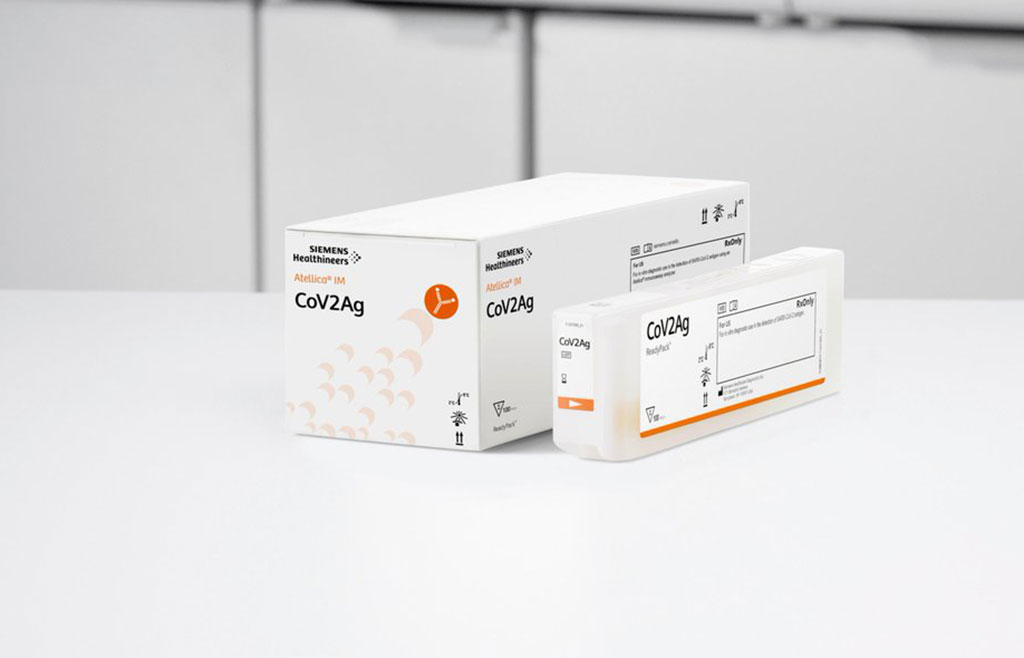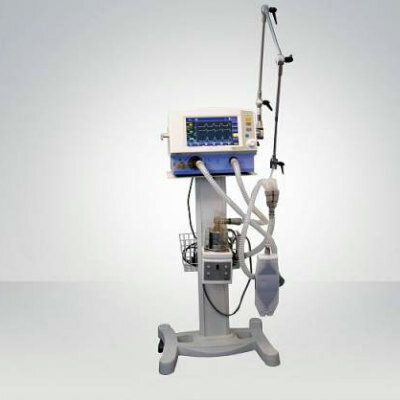Siemens Lab-Based SARS-CoV-2 Antigen Assay (CoV2Ag) Obtains CE Mark for Use with Its High-Throughput Analyzers
|
By HospiMedica International staff writers Posted on 25 Feb 2021 |

Image: Atellica COVAg test (Photo courtesy of Siemens Healthineers)
Siemens Healthineers’ (Erlangen, Germany) laboratory-based SARS-CoV-2 Antigen Assay (CoV2Ag) has obtained CE Mark and is now offered for the Atellica Solution and ADVIA Centaur analyzers, widely available in laboratories worldwide.
The CoV2Ag assay is for in vitro diagnostic use in the qualitative detection of SARS-CoV-2 in nasopharyngeal swab and nasal swab specimens within the first seven days of symptom onset, or from asymptomatic individuals, using the Atellica IM Analyzer or ADVIA Centaur XP and ADVIA Centaur XPT immunoassay Systems. The test has been submitted to the FDA for Emergency Use Authorization. The antigen test detects the nucleocapsid antigen and has been designed with five monoclonal antibodies with the objective to maximize its sensitivity to both current and future SARS-CoV-2 variants. It also offers a leading time-to-result for lab-based antigen tests, making it an ideal tool to test large quantities of patient samples quickly. Additionally, the test helps protect laboratory staff from the virus with a pretreatment process, which inactivates the virus without compromising the quality or validity of patient test results.
The Siemens Healthineers' CoV2Ag test shows strong alignment to molecular RT-PCR methods with sensitivity exceeding 94% and specificity at 100% for the Atellica COVAg test. While molecular RT-PCR diagnostic testing is the gold standard in accuracy, it lacks the high throughput capability of a lab-based, automated antigen test. With availability of CoV2Ag on the Atellica IM Analyzer, laboratories can significantly increase the SARS-CoV-2 testing capacity with a platform that can run up to 440 tests per hour. Other benefits of lab-based, automated antigen testing include simplified pre-analytics and a more economical cost per test compared with RT-PCR testing, making this a cost effective solution to detect infection when high throughput is critical. Such testing could be deployed at on-site collection centers for hospital staff, patients and visitors, remote collection facilities for large scale testing of local populations or in dedicated, pop-up labs at airports or large universities.
"SARS-CoV-2 antigen testing is a critical tool to help support the fight against COVID-19 and identify infected individuals, including those who are asymptomatic," said Deepak Nath, PhD, President of Laboratory Diagnostics at Siemens Healthineers. "High-throughput SARS-CoV-2 antigen testing can help laboratories rapidly scale their SARS-CoV-2 diagnostic testing capacity. The Siemens Healthineers' antigen test offers fast pretreatment time and time to results."
The CoV2Ag assay is for in vitro diagnostic use in the qualitative detection of SARS-CoV-2 in nasopharyngeal swab and nasal swab specimens within the first seven days of symptom onset, or from asymptomatic individuals, using the Atellica IM Analyzer or ADVIA Centaur XP and ADVIA Centaur XPT immunoassay Systems. The test has been submitted to the FDA for Emergency Use Authorization. The antigen test detects the nucleocapsid antigen and has been designed with five monoclonal antibodies with the objective to maximize its sensitivity to both current and future SARS-CoV-2 variants. It also offers a leading time-to-result for lab-based antigen tests, making it an ideal tool to test large quantities of patient samples quickly. Additionally, the test helps protect laboratory staff from the virus with a pretreatment process, which inactivates the virus without compromising the quality or validity of patient test results.
The Siemens Healthineers' CoV2Ag test shows strong alignment to molecular RT-PCR methods with sensitivity exceeding 94% and specificity at 100% for the Atellica COVAg test. While molecular RT-PCR diagnostic testing is the gold standard in accuracy, it lacks the high throughput capability of a lab-based, automated antigen test. With availability of CoV2Ag on the Atellica IM Analyzer, laboratories can significantly increase the SARS-CoV-2 testing capacity with a platform that can run up to 440 tests per hour. Other benefits of lab-based, automated antigen testing include simplified pre-analytics and a more economical cost per test compared with RT-PCR testing, making this a cost effective solution to detect infection when high throughput is critical. Such testing could be deployed at on-site collection centers for hospital staff, patients and visitors, remote collection facilities for large scale testing of local populations or in dedicated, pop-up labs at airports or large universities.
"SARS-CoV-2 antigen testing is a critical tool to help support the fight against COVID-19 and identify infected individuals, including those who are asymptomatic," said Deepak Nath, PhD, President of Laboratory Diagnostics at Siemens Healthineers. "High-throughput SARS-CoV-2 antigen testing can help laboratories rapidly scale their SARS-CoV-2 diagnostic testing capacity. The Siemens Healthineers' antigen test offers fast pretreatment time and time to results."
Latest COVID-19 News
- Low-Cost System Detects SARS-CoV-2 Virus in Hospital Air Using High-Tech Bubbles
- World's First Inhalable COVID-19 Vaccine Approved in China
- COVID-19 Vaccine Patch Fights SARS-CoV-2 Variants Better than Needles
- Blood Viscosity Testing Can Predict Risk of Death in Hospitalized COVID-19 Patients
- ‘Covid Computer’ Uses AI to Detect COVID-19 from Chest CT Scans
- MRI Lung-Imaging Technique Shows Cause of Long-COVID Symptoms
- Chest CT Scans of COVID-19 Patients Could Help Distinguish Between SARS-CoV-2 Variants
- Specialized MRI Detects Lung Abnormalities in Non-Hospitalized Long COVID Patients
- AI Algorithm Identifies Hospitalized Patients at Highest Risk of Dying From COVID-19
- Sweat Sensor Detects Key Biomarkers That Provide Early Warning of COVID-19 and Flu
- Study Assesses Impact of COVID-19 on Ventilation/Perfusion Scintigraphy
- CT Imaging Study Finds Vaccination Reduces Risk of COVID-19 Associated Pulmonary Embolism
- Third Day in Hospital a ‘Tipping Point’ in Severity of COVID-19 Pneumonia
- Longer Interval Between COVID-19 Vaccines Generates Up to Nine Times as Many Antibodies
- AI Model for Monitoring COVID-19 Predicts Mortality Within First 30 Days of Admission
- AI Predicts COVID Prognosis at Near-Expert Level Based Off CT Scans
Channels
Artificial Intelligence
view channel
AI-Powered Algorithm to Revolutionize Detection of Atrial Fibrillation
Atrial fibrillation (AFib), a condition characterized by an irregular and often rapid heart rate, is linked to increased risks of stroke and heart failure. This is because the irregular heartbeat in AFib... Read more
AI Diagnostic Tool Accurately Detects Valvular Disorders Often Missed by Doctors
Doctors generally use stethoscopes to listen for the characteristic lub-dub sounds made by heart valves opening and closing. They also listen for less prominent sounds that indicate problems with these valves.... Read moreCritical Care
view channel
Powerful AI Risk Assessment Tool Predicts Outcomes in Heart Failure Patients
Heart failure is a serious condition where the heart cannot pump sufficient blood to meet the body's needs, leading to symptoms like fatigue, weakness, and swelling in the legs and feet, and it can ultimately... Read more
Peptide-Based Hydrogels Repair Damaged Organs and Tissues On-The-Spot
Scientists have ingeniously combined biomedical expertise with nature-inspired engineering to develop a jelly-like material that holds significant promise for immediate repairs to a wide variety of damaged... Read more
One-Hour Endoscopic Procedure Could Eliminate Need for Insulin for Type 2 Diabetes
Over 37 million Americans are diagnosed with diabetes, and more than 90% of these cases are Type 2 diabetes. This form of diabetes is most commonly seen in individuals over 45, though an increasing number... Read moreSurgical Techniques
view channel
Miniaturized Implantable Multi-Sensors Device to Monitor Vessels Health
Researchers have embarked on a project to develop a multi-sensing device that can be implanted into blood vessels like peripheral veins or arteries to monitor a range of bodily parameters and overall health status.... Read more
Tiny Robots Made Out Of Carbon Could Conduct Colonoscopy, Pelvic Exam or Blood Test
Researchers at the University of Alberta (Edmonton, AB, Canada) are developing cutting-edge robots so tiny that they are invisible to the naked eye but are capable of traveling through the human body to... Read more
Miniaturized Ultrasonic Scalpel Enables Faster and Safer Robotic-Assisted Surgery
Robot-assisted surgery (RAS) has gained significant popularity in recent years and is now extensively used across various surgical fields such as urology, gynecology, and cardiology. These surgeries, performed... Read morePatient Care
view channelFirst-Of-Its-Kind Portable Germicidal Light Technology Disinfects High-Touch Clinical Surfaces in Seconds
Reducing healthcare-acquired infections (HAIs) remains a pressing issue within global healthcare systems. In the United States alone, 1.7 million patients contract HAIs annually, leading to approximately... Read more
Surgical Capacity Optimization Solution Helps Hospitals Boost OR Utilization
An innovative solution has the capability to transform surgical capacity utilization by targeting the root cause of surgical block time inefficiencies. Fujitsu Limited’s (Tokyo, Japan) Surgical Capacity... Read more
Game-Changing Innovation in Surgical Instrument Sterilization Significantly Improves OR Throughput
A groundbreaking innovation enables hospitals to significantly improve instrument processing time and throughput in operating rooms (ORs) and sterile processing departments. Turbett Surgical, Inc.... Read moreHealth IT
view channel
Machine Learning Model Improves Mortality Risk Prediction for Cardiac Surgery Patients
Machine learning algorithms have been deployed to create predictive models in various medical fields, with some demonstrating improved outcomes compared to their standard-of-care counterparts.... Read more
Strategic Collaboration to Develop and Integrate Generative AI into Healthcare
Top industry experts have underscored the immediate requirement for healthcare systems and hospitals to respond to severe cost and margin pressures. Close to half of U.S. hospitals ended 2022 in the red... Read more
AI-Enabled Operating Rooms Solution Helps Hospitals Maximize Utilization and Unlock Capacity
For healthcare organizations, optimizing operating room (OR) utilization during prime time hours is a complex challenge. Surgeons and clinics face difficulties in finding available slots for booking cases,... Read more
AI Predicts Pancreatic Cancer Three Years before Diagnosis from Patients’ Medical Records
Screening for common cancers like breast, cervix, and prostate cancer relies on relatively simple and highly effective techniques, such as mammograms, Pap smears, and blood tests. These methods have revolutionized... Read morePoint of Care
view channel
Critical Bleeding Management System to Help Hospitals Further Standardize Viscoelastic Testing
Surgical procedures are often accompanied by significant blood loss and the subsequent high likelihood of the need for allogeneic blood transfusions. These transfusions, while critical, are linked to various... Read more
Point of Care HIV Test Enables Early Infection Diagnosis for Infants
Early diagnosis and initiation of treatment are crucial for the survival of infants infected with HIV (human immunodeficiency virus). Without treatment, approximately 50% of infants who acquire HIV during... Read more
Whole Blood Rapid Test Aids Assessment of Concussion at Patient's Bedside
In the United States annually, approximately five million individuals seek emergency department care for traumatic brain injuries (TBIs), yet over half of those suspecting a concussion may never get it checked.... Read more
New Generation Glucose Hospital Meter System Ensures Accurate, Interference-Free and Safe Use
A new generation glucose hospital meter system now comes with several features that make hospital glucose testing easier and more secure while continuing to offer accuracy, freedom from interference, and... Read moreBusiness
view channel
Johnson & Johnson Acquires Cardiovascular Medical Device Company Shockwave Medical
Johnson & Johnson (New Brunswick, N.J., USA) and Shockwave Medical (Santa Clara, CA, USA) have entered into a definitive agreement under which Johnson & Johnson will acquire all of Shockwave’s... Read more















